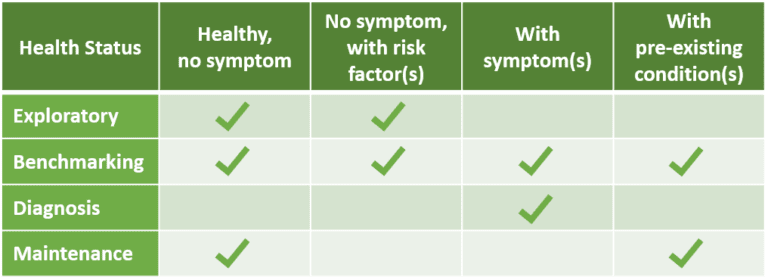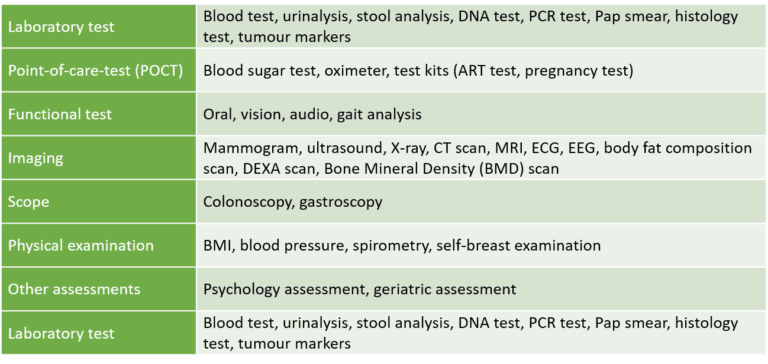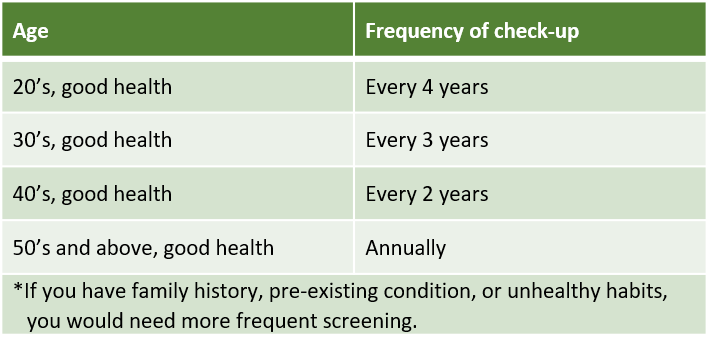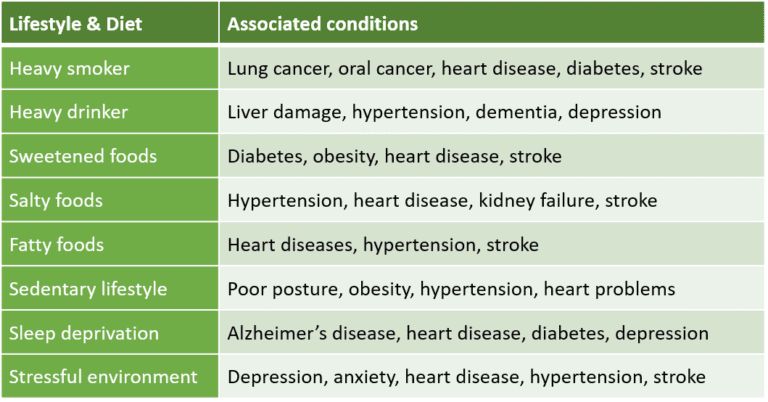Page Contents
You are living a healthy lifestyle and diet, but that does not guarantee you will be healthy forever. You do not know whether you are at risk of certain diseases because of your genetic makeup or environmental exposure. Many diseases have higher occurrence as you age because you will be exposed to more risks, you have decreased immunity and weakened body functions. It is important to benchmark your current state of health, and this can be done through a health screening. The advancement of medical technologies and development of diagnostic tests have made health screening very accessible and affordable. Early detection ensures more treatment options and higher chances of recovery.
When do you need a health screening?
A health screening is not only required when you are in bad shape (that could be too late). The objectives can be suited to different states of health (Figure 1).

- If you are healthy and have no symptom, doing a health screening is for benchmarking and maintaining your current health, preventing diseases, and taking an opportunistic approach to pick up potential risks.
- In the event that you have no symptom, but exposed to potential risk factors, health screening is helpful for knowing your existing state and identifying health risk.
- When you start to have any symptom, a health screening can serve as a diagnostic tool and benchmark your stage of condition.
- If you already have pre-existing medical condition, doctor usually perform a health screening to find out your current state and advise how you can maintain it to avoid further deterioration.
Types of health screening
Health screening can be any tests ranging from self-performed test to sophisticated medical examinations.

Of all the test methods in Figure 2, physical examination, functional test, blood test and POCT are the primary methods used by doctors to acquire fast and useful information of a patient’s condition.
Frequency for health screening
It is recommended to go for regular health screening to check and pick up indicators of potential health risks and diseases, so that you can take preventive actions early. A general guideline for the frequency of blood test is shown in Figure 3.

Elderly people are encouraged to check their vision, hearing, oral (and teeth), gait, bone density on yearly basis. Sometimes, when you are with certain professions, e.g., athletes, defence forces, healthcare, etc., you will be required to screen more frequently. Also, if you are applying for a new job or subscribing an insurance plan, you may be required to go for medical check-up.
Risk factors
- Ageing
As you age, you have a higher chance of developing cancers and chronic conditions. The frequency of health screening should increase to pick up early sign and symptoms.
- Gender-specific disease
Some illnesses are gender-specific. For example, ovarian and cervical cancer in women, prostate and testicular cancer in men. For female ages 21 – 65, pap smear for every 3 years is recommended to detect cervical cancer.
- Occupational health hazards
Occupational hazards can cause some conditions such as hearing loss, cancer, mental disorder, infectious diseases, lung diseases, dermatitis. The longer your exposure to the hazardous environment, the higher chance of you developing diseases and complications.
- Lifestyle-linked conditions
Chronic conditions such as heart diseases, diabetes, hypertension, stroke, cancer develop over a long period of time. Unhealthy lifestyle and diet are the main contributing factors to many of these chronic conditions (Figure 4). In the previous articles, we have covered various topics on smoking, alcohol, sweet foods, salty foods, oily foods, sedentary, and sleep problems.

Vaccinations
Healthy lifestyle and good nutrition are your primary protection, while vaccinations could serve as your secondary defence system. Vaccination is to condition your body to fight against deadly viruses and bacterial infections.
Vaccines boost your immune system by training and activating your immune cells to generate antibodies. When your body is exposed to the same virus again, your body will respond faster and minimize the uncomfortable effects of the immune response.
As of the time of writing, the whole world is combating COVID-19 with vaccines; Children in many countries are given measles, mumps, rubella, polio, hepatitis A and B vaccines; Other common vaccines also include chickenpox, diphtheria, flu, HPV, pertussis, pneumococcal, rotavirus, shingles and tetanus.
Some people are not advisable for certain vaccines, such as:
- Have history of severe allergy reaction against vaccines
- At very young or old age
- Pregnant
- Have chronic conditions
- Have compromised immune systems (AIDS)
- Undergoing aggressive medical treatments (chemotherapy)
More information can be found in Healthline and CDC website.
Conclusion
For some people who are predisposed to inherited diseases, evidence can be traced through family history, for example, hereditary breast cancer, haemophilia, Huntington’s disease, and so on. Consultation with a doctor or genetic counsellor can be useful to learn how to live with the diseases.
As the saying goes, prevention is better than cure. There are only 2 things that are essential:
- Take care of your health (healthy lifestyle, healthy diet).
- Understand and benchmark your current health status.
If you do not take care of your health today, falling ill and seeking treatment is an unnecessary yet avoidable cost (and pain).
